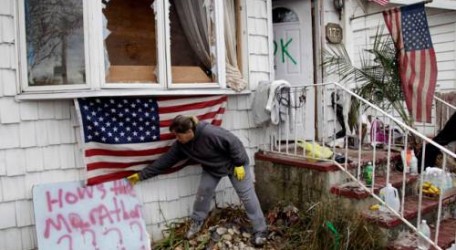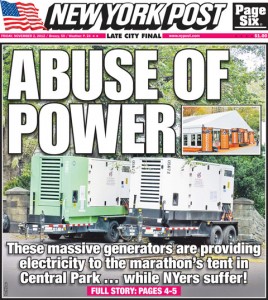
Stop the publicity…I want to get off!
If Super Storm Sandy had not hit New York last week, many of us today would have been watching the iconic New York marathon on TV.
Nathan Farrugia and his wife Deirdre were among the thousands who were assured by the NY Mayor Michael Bloomberg that despite the devastation caused by the storm, the marathon would still be held. The couple arrived in the city on Thursday, but to their understandable disappointment, late on Friday Mayor Bloomberg had to bow down to angry public pressure and call off the race.
The biggest criticism coming from international runners is why the decision took so long to be taken. But when you start reading the reports of the dilemma the authorities were facing it soon becomes clear that this was a hugely divisive issue. On the one hand you had the enormous investment which had already been made by sponsors, the training and commitment of the athletes and the economic input which the marathon injects into the city. But on the other hand you had the stark reality of a city which had been crippled by flooding, horrible deaths and structural damage.
According to a report by CNN.com:
“The announcement (that the race would go on as scheduled) sparked a chorus of criticism from local authorities and residents, inspired a boycott effort on Facebook, and became a trending topic on Twitter as users called for the race’s postponement.
And after the public outcry grew close to deafening on Friday, city and race officials announced they would cancel the race for the first time in its 42-year history.
… U.S. Rep. Michael Grimm, who represents Staten Island and Brooklyn, said before Friday’s announcement that the city had its priorities wrong.
“We’re still pulling bodies out of the water and the mayor is worried about marathon runners and returning to life as normal,” Grimm said in a statement. “The Verrazano Bridge should be used for getting fuel and food in to Staten Island, not getting runners out.”
… And Friday’s cover of The New York Post also weighed in on the controversy. A simple, but powerful, headline over a photo of two generators read: “Abuse of Power: These massive generators are providing electricity to the marathon’s tent inCentral Parkwhile NYers suffer!”
It is in the light of this kind of media and public pressure that the marathon was cancelled.
As I said earlier, the disappointment of runners such as the Farrugias, who spent a lot of money and travelled across the world to take part, is something every marathon runner can connect with. Unfortunately, however, Nathan’s own posts on his Facebook wall in which he harshly criticizes the “selfishness of New Yorkers”, as well as his comments in today’s story in The Sunday Times in which he speaks of his disappointment, have painted a rather unflattering picture of the man who happens to be CEO of one of Malta’s biggest charities, Inspire.
Although his FB comments were probably written in anger and frustration, I have to admit to being taken aback because, of all people, he should have been the first to show compassion at why the authorities took the decision they did. After all, how can you still go ahead and run in a marathon through the streets of a city surrounded by so many people who are now homeless and whose lives have been ruined?
As one New York runner pointed out, “it just didn’t feel right”.
The Maltese public this morning was also quick to respond to Nathan Farrugia’s misguided comments, lashing back at him with their own criticism. Were they too harsh? Were they being too judgmental?
I don’t think so. People reacted to what they read, and what they were reading did not put the couple in a good light at all (Nathan has since pointed out that he was misquoted, and the headline of the online story has been changed from “Maltese fume at New York race stop” to “Maltese athletes to help in NY relief efforts after marathon disappointment”).
This, unfortunately, is the double edged-sword of being in the public eye. When one is such a high profile figure, every word needs to be measured and carefully thought through and the possibility that there might be unwanted repercussions has to be weighed. The immediacy of online comments, Facebook and Twitter means that whatever you write in cyber space can be picked up and quoted back at you in seconds.
Just as positive publicity can generate widespread recognition and create awareness, negative publicity can just as quickly taint your reputation. As so many public figures have learned to their dismay, you cannot simply switch off the limelight when the tide of public opinion turns against you.
You can, however, admit that you made a mistake and retract what you said, which always goes a long way to remedy any situation.
- November 4, 2012 No comments Posted in: Opinion column






